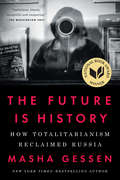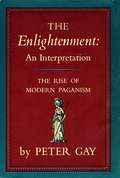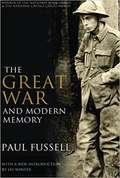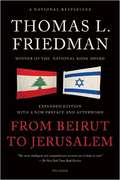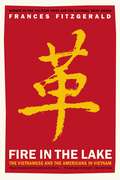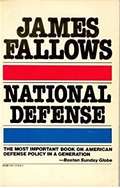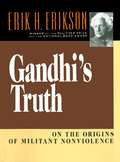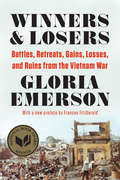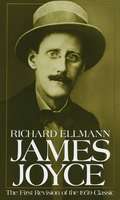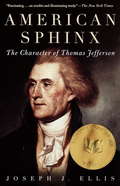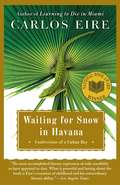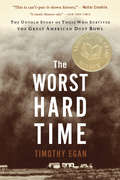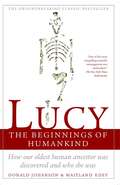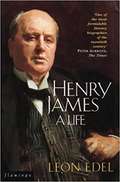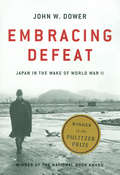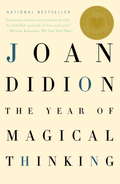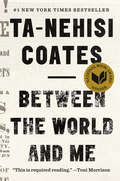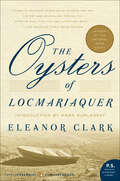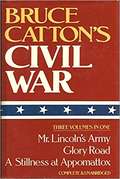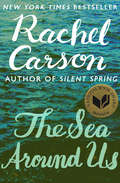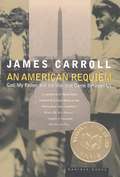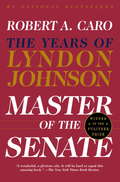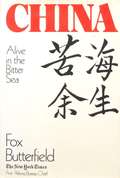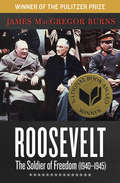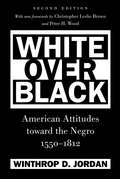Special Collections
National Book Award Winners - Non-Fiction
- Table View
- List View
The Future Is History
by Masha GessenLonglisted for the 2017 National Book Award in NonfictionPutin’s bestselling biographer reveals how, in the space of a generation, Russia surrendered to a more virulent and invincible new strain of autocracy. Hailed for her “fearless indictment of the most powerful man in Russia” (The Wall Street Journal), award-winning journalist Masha Gessen is unparalleled in her understanding of the events and forces that have wracked her native country in recent times. In The Future Is History, she follows the lives of four people born at what promised to be the dawn of democracy. Each of them came of age with unprecedented expectations, some as the children and grandchildren of the very architects of the new Russia, each with newfound aspirations of their own—as entrepreneurs, activists, thinkers, and writers, sexual and social beings. Gessen charts their paths against the machinations of the regime that would crush them all, and against the war it waged on understanding itself, which ensured the unobstructed reemergence of the old Soviet order in the form of today’s terrifying and seemingly unstoppable mafia state. Powerful and urgent, The Future Is History is a cautionary tale for our time and for all time.
The Enlightenment
by Peter GayThe eighteenth-century Enlightenment marks the beginning of the modern age, when the scientific method and belief in reason and progress came to hold sway over the Western world. In the twentieth century, however, the Enlightenment has often been judged harshly for its apparently simplistic optimism. Now a master historian goes back to the sources to give a fully rounded account of its true accomplishments.
Winner of the National Book Award
The Great War and Modern Memory
by Paul FussellFussell writes: This book is about the British experience on the Western Front from 1914 to 1918 and some of the literary means by which it has been remembered, conventionalized, and mythologized. It is also about the literary dimensions of the trench experience itself. Indeed, if the book had a subtitle, it would be something like "An Inquiry into the Curious Literariness of Real Life."
Winner of the National Book Award
From Beirut to Jerusalem
by Thomas L. Friedman"Friedman, who twice garnered the Pulitzer as a New York Times correspondent in Lebanon and Israel, further delineates the two countries in this provocative, absorbing memoir cum political and social analysis. A condensed, incisive history of the Middle East is proffered, as well as personal reflections on his 10-year sojourn: the issue of Friedman's Jewishness in Beirut, the fact that he was the Times 's first Jewish reporter in Israel, the bombing of his apartment in Beirut by the PLO, which took the lives of his Lebanese news assistant's children." -From Publishers Weekly
Winner of the National Book Award
Fire in the Lake
by Frances FitzgeraldThis landmark work, based on Frances FitzGerald's own research and travels, takes us inside Vietnam into the traditional, ancestor-worshiping villages and the corrupt crowded cities, into the conflicts between Communists and anti-Communists, Catholics and Buddhists, generals and monks and reveals the country as seen through Vietnamese eyes.
With a clarity and authority unrivaled by any book before it or since, Fire in the Lake shows how America utterly and tragically misinterpreted the realities of Vietnam.
Winner of the Pulitzer Prize
Winner of the National Book Award
National Defense
by James FallowsTHIS BOOK is designed to give the general reader better ways of thinking about defense. In the first few years of the 1980s, the United States will have to make choices of enormous consequence about the size, purpose, and composition of its military force. These include whether to restore the draft, build new nuclear missiles and bombers, enlarge the Navy, equip a "rapid deployment force" for intervention overseas.
Winner of the National Book Award
Gandhi's Truth
by Erik H. EriksonIn this study of Mahatma Gandhi, psychoanalyst Erik H. Erikson explores how Gandhi succeeded in mobilizing the Indian people both spiritually and politically as he became the revolutionary innovator of militant non-violence and India became the motherland of large-scale civil disobedience.
Winner of the National Book Award
Pulitzer Prize Winner
Winners & Losers
by Frances Fitzgerald and Gloria EmersonThe National Book Award-winning classic on the Vietnam War, reissued for the war's fiftieth anniversary. Based on interviews with both Americans and Vietnamese, Winners and Losers is Gloria Emerson's powerful portrait of the Vietnam War. From soldiers on the battlefield to protesters on the home front, Emerson chronicles the war's impact on ordinary lives with characteristic insight and brilliance. Today, as we approach the fiftieth anniversary of the Gulf of Tonkin incident, much of the physical and emotional damage from that conflict--the empty political rhetoric, the mounting casualties, and the troubled homecomings of shell-shocked soldiers--is once again part of the American experience. Winners and Losers remains a potent reminder of the danger of blindly applied American power, and its poignant truths are the legacy of a remarkable journalist.
James Joyce
by Richard EllmannBiography of the Irish author. Listed #73 on Modern Library's top 100 nonfiction books of the century.
Winner of the National Book Award
American Sphinx
by Joseph J. EllisFor a man who insisted that life on the public stage was not what he had in mind, Thomas Jefferson certainly spent a great deal of time in the spotlight--and not only during his active political career. After 1809, his longed-for retirement was compromised by a steady stream of guests and tourists who made of his estate at Monticello a virtual hotel, as well as by more than one thousand letters per year, most from strangers, which he insisted on answering personally. In his twilight years Jefferson was already taking on the luster of a national icon, which was polished off by his auspicious death (on July 4, 1826); and in the subsequent seventeen decades of his celebrity--now verging, thanks to virulent revisionists and television documentaries, on notoriety--has been inflated beyond recognition of the original person.
For the historian Joseph J. Ellis, the experience of writing about Jefferson was "as if a pathologist, just about to begin an autopsy, has discovered that the body on the operating table was still breathing." In American Sphinx, Ellis sifts the facts shrewdly from the legends and the rumors, treading a path between vilification and hero worship in order to formulate a plausible portrait of the man who still today "hover[s] over the political scene like one of those dirigibles cruising above a crowded football stadium, flashing words of inspiration to both teams." For, at the grass roots, Jefferson is no longer liberal or conservative, agrarian or industrialist, pro- or anti-slavery, privileged or populist. He is all things to all people. His own obliviousness to incompatible convictions within himself (which left him deaf to most forms of irony) has leaked out into the world at large--a world determined to idolize him despite his foibles.
From Ellis we learn that Jefferson sang incessantly under his breath; that he delivered only two public speeches in eight years as president, while spending ten hours a day at his writing desk; that sometimes his political sensibilities collided with his domestic agenda, as when he ordered an expensive piano from London during a boycott (and pledged to "keep it in storage"). We see him relishing such projects as the nailery at Monticello that allowed him to interact with his slaves more palatably, as pseudo-employer to pseudo-employees. We grow convinced that he preferred to meet his lovers in the rarefied region of his mind rather than in the actual bedchamber. We watch him exhibiting both great depth and great shallowness, combining massive learning with extraordinary naïveté, piercing insights with self-deception on the grandest scale. We understand why we should neither beatify him nor consign him to the rubbish heap of history, though we are by no means required to stop loving him. He is Thomas Jefferson, after all--our very own sphinx.
Winner of the National Book Award
Waiting for Snow in Havana
by Carlos Eire"Have mercy on me, Lord, I am Cuban." In 1962, Carlos Eire was one of 14,000 children airlifted out of Havana--exiled from his family, his country, and his own childhood by Fidel Castro's revolution. Winner of the National Book Award, this stunning memoir is a vibrant and evocative look at Latin America from a child's unforgettable experience.Waiting for Snow in Havana is both an exorcism and an ode to a paradise lost. For the Cuba of Carlos's youth--with its lizards and turquoise seas and sun-drenched siestas--becomes an island of condemnation once a cigar-smoking guerrilla named Fidel Castro ousts President Batista on January 1, 1959. Suddenly the music in the streets sounds like gunfire. Christmas is made illegal, political dissent leads to imprisonment, and too many of Carlos's friends are leaving Cuba for a place as far away and unthinkable as the United States. Carlos will end up there, too, and fulfill his mother's dreams by becoming a modern American man--even if his soul remains in the country he left behind. Narrated with the urgency of a confession, Waiting for Snow in Havana is a eulogy for a native land and a loving testament to the collective spirit of Cubans everywhere. lost. More than that, it captures the terrible beauty of those times in our lives when we are certain we have died -- and then are somehow, miraculously, reborn.
The Worst Hard Time
by Timothy EganThe author, Timothy Egan, tells a touching story of the individuals and families that survived the depression and the great American dust bowl during the 1930's through walking the land, diaries of survivors and talking with those individuals who lived through Black Sunday and still live in the high plains, which came to be known as the dust bowl. These stories focus around the towns of Dalhart and Boise in the Texas panhandle and how, when the soil of the plains took to the air, after millions of acres of prairie grass was plowed under and for months blew 20 plus days out of 30, with temperatures in the 120 degree range or dropped below zero while farmers huddled in dugouts in the ground, mothers watched their children die of dust pneumonia, they still held to the land. As the decade wore on, FDR's new deal programs attempted to assist the families of the high plains and struggled with the greatest ecological disaster of our country.
Winner of the National Book Award
Lucy
by Maitland A. Edey and Donald C. JohansenThe dramatic discovery of our oldest human ancestor and the controversial change it makes in our view of human origins
Winner of the National Book Award
Henry James
by Leon EdelThis is the one-volume edition of a famous biography of Henry James. Born in America, Henry James was educated both there and in Europe before settling in London, where he was to spend most of his life, in 1876. His novels represent the culmination of the 19th-century realist tradition of Austen, George Eliot, Flauberty and Balzac, and a decisive step towards the experimental modernism of Woolf and T.S. Eliot. His works often focus upon an innocent American in Europe, and assess the qualities and dangers of both American and European culture at the time, as well as showing their vast differences. "A Portrait of a Lady", "The Ambassadors" and "The Golden Bowl" all explore this subject, whilst Honore de Balzac's "Eugenie Grandet" was so admired by James that he was inspired to write "Washington Square", his own version of the tale. James's works explore sexual roles, feminism and class conflict.
Winner of the National Book Award
Pulitzer Prize Winner
Embracing Defeat
by John W. DowerDrawing on a vast range of Japanese sources and illustrated with dozens of astonishing documentary photographs, Embracing Defeat is the fullest and most important history of the more than six years of American occupation, which affected every level of Japanese society, often in ways neither side could anticipate. Dower, whom Stephen E. Ambrose has called "America's foremost historian of the Second World War in the Pacific," gives us the rich and turbulent interplay between West and East, the victor and the vanquished, in a way never before attempted, from top-level manipulations concerning the fate of Emperor Hirohito to the hopes and fears of men and women in every walk of life. Already regarded as the benchmark in its field, Embracing Defeat is a work of colossal scholarship and history of the very first order. John W. Dower is the Elting E. Morison Professor of History at the Massachusetts Institute of Technology. He is a winner of the National Book Critics Circle Award for War Without Mercy.
Winner of the National Book Award.
Pulitzer Prize Winner
The Year of Magical Thinking
by Joan DidionJoan Didion explores an intensely personal yet universal experience: several days before Christmas 2003, John Gregory Dunne and Joan Didion saw their only daughter, Quintana, fall ill with what seemed at first flu, then pneumonia, then complete septic shock. She was put into an induced coma and placed on life support. Days later, the night before New Year's Eve, the Dunnes were just sitting down to dinner after visiting the hospital when John Gregory Dunne suffered a massive and fatal coronary. In a second, this close, symbiotic partnership of forty years was over. Four weeks later, their daughter pulled through. Two months after that, arriving at LAX, she collapsed and underwent six hours of brain surgery at UCLA Medical Center to relieve a massive hematoma.
This powerful book is Didion's attempt to make sense of the weeks and then months that cut loose any fixed idea she ever had about death, about illness, about marriage and children and memory, about the shallowness of sanity, about life itself.
Winner of the National Book Award
Between the World and Me
by Ta-Nehisi Coates“This is your country, this is your world, this is your body, and you must find some way to live within the all of it.”
In a profound work that pivots from the biggest questions about American history and ideals to the most intimate concerns of a father for his son, Ta-Nehisi Coates offers a powerful new framework for understanding our nation’s history and current crisis. Americans have built an empire on the idea of “race,” a falsehood that damages us all but falls most heavily on the bodies of black women and men—bodies exploited through slavery and segregation, and, today, threatened, locked up, and murdered out of all proportion. What is it like to inhabit a black body and find a way to live within it? And how can we all honestly reckon with this fraught history and free ourselves from its burden?
Between the World and Me is Ta-Nehisi Coates’s attempt to answer these questions in a letter to his adolescent son. Coates shares with his son—and readers—the story of his awakening to the truth about his place in the world through a series of revelatory experiences, from Howard University to Civil War battlefields, from the South Side of Chicago to Paris, from his childhood home to the living rooms of mothers whose children’s lives were taken as American plunder. Beautifully woven from personal narrative, reimagined history, and fresh, emotionally charged reportage, Between the World and Me clearly illuminates the past, bracingly confronts our present, and offers a transcendent vision for a way forward.
Winner of the National Book Award
Winner of the 2016 Alex Award (10 best adult books that appeal to teen audiences)
Nominee for the 2018 Young Reader's Choice Award (Pacific Northwest Library Association)
The Oysters of Locmariaquer
by Eleanor ClarkWinner of the National Book Award“What an elegant book this is, starting with that most elegant of creatures, the Belon oyster. . . . [Clark’s] fantastic blending of science and art, history and journalism, brings the appetite back for life and literature both.” — Los Angeles Times Book ReviewOn the northwest coast of France, just around the corner from the English Channel, is the little town of Locmariaquer (pronounced "loc-maria-care"). The inhabitants of this town have a special relationship to the world, for it is their efforts that maintain the supply of the famous Belon oysters, called les plates ("the flat ones"). A vivid account of the cultivation of Belon oysters and an excursion into the myths, legends, and rich, vibrant history of Brittany and its extraordinary people, The Oysters of Locmariaquer is also an unforgettable journey to the heart of a fascinating culture and the enthralling, accumulating drama of a unique devotion.
Bruce Catton's Civil War
by Bruce CattonInfinitely readable and absorbing, Bruce Catton's "The Civil War" is one of the best-selling, most widely read general histories of the war, now available in a single ominbus volume. The Civil War vividly traces one of the most moving chapters in American history, from the early division between the North and the South to the final surrender of Confederate troops. Catton's account of battles is carefully interwoven with details about the political activities of the Union and Confederate armies and diplomatic efforts overseas.
Winner of the Pulitzer Prize
Winner of the National Book Award
The Sea Around Us
by Rachel CarsonNational Book Award Winner and New York Times Bestseller: Explore earth&’s most precious, mysterious resource—the ocean—with the author of Silent Spring. With more than one million copies sold, Rachel Carson&’s The Sea Around Us became a cultural phenomenon when first published in 1951 and cemented Carson&’s status as the preeminent natural history writer of her time. Her inspiring, intimate writing plumbs the depths of an enigmatic world—a place of hidden lands, islands newly risen from the earth&’s crust, fish that pour through the water, and the unyielding, epic battle for survival. Firmly based in the scientific discoveries of the time, The Sea Around Us masterfully presents Carson&’s commitment to a healthy planet and a fully realized sense of wonder. This ebook features an illustrated biography of Rachel Carson including rare photos and never-before-seen documents from the Beinecke Rare Book and Manuscript Library at Yale University.
An American Requiem
by James CarrollNational Book Award winner: This story of a family torn apart by the Vietnam era is &“a magnificent portrayal of two noble men who broke each other&’s hearts&” (Booklist). James Carroll grew up in a Catholic family that seemed blessed. His father, who had once dreamed of becoming a priest, instead began a career in J. Edgar Hoover&’s FBI, rising through the ranks and eventually becoming one of the most powerful men in the Pentagon, the founder of the Defense Intelligence Agency. Young Jim lived a privileged life, dating the daughter of a vice president and meeting the pope—all in the shadow of nuclear war, waiting for the red telephone to ring in his parents&’ house. James fulfilled the goal his father had abandoned, becoming a priest himself. His feelings toward his father leaned toward worship as well—until the tumult of the 1960s came between them. Their disagreements, over Martin Luther King, Jr. and the civil rights movement; turmoil in the Church; and finally, Vietnam—where the elder Carroll chose targets for US bombs—began to outweigh the bond between them. While one of James&’s brothers fled to Canada, another was in law enforcement ferreting out draft dodgers. James, meanwhile, served as a chaplain at Boston University, protesting the war in the streets but ducking news cameras to avoid discovery. Their relationship would never be the same again. Only after Carroll left the priesthood to become a writer, and a husband with children of his own, did he begin to understand fully the struggles his father had faced. In An American Requiem, the New York Times bestselling author of Constantine&’s Sword and Christ Actually offers a benediction, in &“a moving memoir of the effect of the Vietnam War on his family that is at once personal and the story of a generation . . . at once heartbreaking and heroic, this is autobiography at its best&” (Publishers Weekly).
Master of the Senate
by Robert A. CaroThe most riveting political biography of our time, Robert A. Caro's life of Lyndon B. Johnson, continues. Master of the Senate takes Johnson's story through one of its most remarkable periods: his twelve years, from 1949 through 1960, in the United States Senate. Once the most august and revered body in politics, by the time Johnson arrived the Senate had become a parody of itself and an obstacle that for decades had blocked desperately needed liberal legislation. Caro shows how Johnson's brilliance, charm, and ruthlessness enabled him to become the youngest and most powerful Majority Leader in history and how he used his incomparable legislative genius--seducing both Northern liberals and Southern conservatives--to pass the first Civil Rights legislation since Reconstruction. Brilliantly weaving rich detail into a gripping narrative, Caro gives us both a galvanizing portrait of Johnson himself and a definitive and revelatory study of the workings of legislative power.
Winner of the National Book Award
Winner of the Pulitzer Prize
China
by Fox ButterfieldIn 1979 Fox Butterfield became the first New York Times correspondent in China in 30 years. He wrote this book about his experiences during the two years he was a correspondent there.
Winner of the National Book Award
Roosevelt
by James MacGregor BurnsThe &“engrossing&” Pulitzer Prize and National Book Award–winning history of FDR&’s final years (Barbara Tuchman). The second entry in James Macgregor Burns&’s definitive two-volume biography of Franklin Delano Roosevelt begins with the president&’s precedent-breaking third term election in 1940, just as Americans were beginning to face the likelihood of war. Here, Burns examines Roosevelt&’s skillful wartime leadership as well as his vision for post-war peace. Hailed by William Shirer as &“the definitive book on Roosevelt in the war years,&” and by bestselling author Barbara Tuchman as &“engrossing, informative, endlessly readable,&” The Soldier of Freedom is a moving profile of a leader gifted with rare political talent in an era of extraordinary challenges, sacrifices, heroism, and hardship.
White Over Black
by Winthrop D. Jordan and Christopher Leslie Brown and Peter H. WoodIn 1968, Winthrop D. Jordan set out in encyclopedic detail the evolution of white Englishmen's and Anglo-Americans' perceptions of blacks, perceptions of difference used to justify race-based slavery, and liberty and justice for whites only. This second edition, with new forewords by historians Christopher Leslie Brown and Peter H. Wood, reminds us that Jordan's text is still the definitive work on the history of race in America in the colonial era. Every book published to this day on slavery and racism builds upon his work; all are judged in comparison to it; none has surpassed it.
National Book Award Winner
